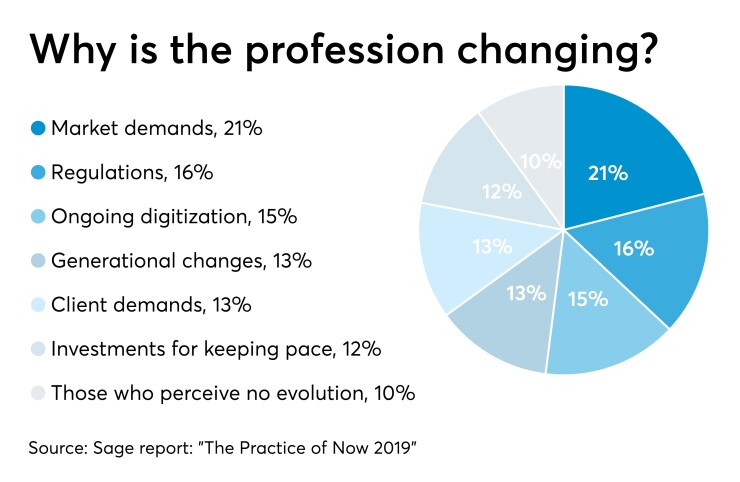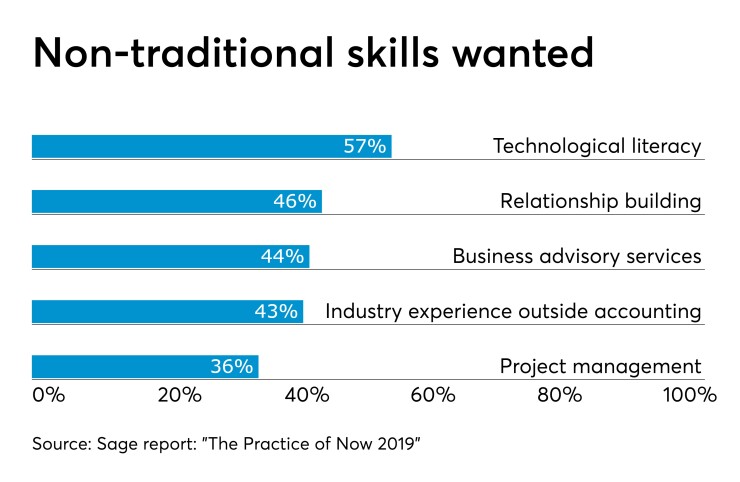Accountants are more ready than ever before to talk about cultural shift.
According to a survey commissioned by ERP and accounting software provider Sage, 90 percent of accountants believe there has been a cultural shift wherein professionals no longer see themselves as number crunchers. Survey data suggest that this shift is being partly driven by clients and the marketplace, which together are demanding much more than the traditional number crunching that has historically driven the accounting profession. Workforces are becoming ever more multigenerational — as baby boomers meet millennials, the profession is being influenced by new and different attitudes, expectations and skills.

Jennifer Warawa, executive vice president of partners, accountants and alliances at Sage, said during a panel discussion at Sage Summit on May 14 that while in the past accountants would always respond “yes” to whether they were fostering diversity and inclusion in their firm culture — because nobody wants to say “no” — she now feels that firms are starting to put into place real strategies for building a diverse staff.
This shift shows a move slightly away from the hyper-focus on new technology when compared to last year’s survey, and a new focus on building strong firms with distinctive cultures that lasts. According to Warawa, technology has enabled this shift: “The ongoing digital revolution is also contributing to this overall shift, with technologies like cloud computing becoming mainstream and artificial intelligence easing the administrative burden,” she stated in the survey report. “This progress has helped forward-thinking practices be more productive, while forcing them to accept the challenges of improving man with machine.”
However, less than one-third of firms are actively seeking to diversify their workforce, and even fewer firms have a written policy on, or a commitment to, diversity and inclusion, according to the survey.
“My interns from medical backgrounds are some of the best,” said Tiffany Wilson, owner of Check and Balance accounting firm in Atlanta, during the panel discussion. “They’re used to always charting, which makes them good bookkeepers. Sometimes people from accounting backgrounds want to jump into management quickly. So hiring from non-traditional backgrounds can be beneficial. Firms are always looking for new ways of thinking.”
Another panelist, Paul Young, president of American Financial Management, an accounting firm based in Birmingham, Alabama, said that compassion and volunteerism are the first qualities he seeks in new hires. “Without compassion you can’t learn,” he said. “If you’re not willing to give, you can’t receive. You have to be real sensitive to the personal and emotional information clients disclose.”

As a company, Sage has created an internal council assigned with building diversity and inclusion in its own staff makeup. The survey report reflects the priorities of the company’s efforts: “A diverse workforce is likely to be key to empathizing or problem-solving in various situations,” the report stated. “A workforce that mirrors the client base is far more approachable, appealing and creative. All of these considerations help practices meet the challenges presented by businesses over a horizon to 2030.”
A new attitude toward tech
The survey also showed an increasingly positive (rather than fearful) attitude towards technology: “Accountants are more positive than ever about the benefits of technology and are embracing new disruptors, like artificial intelligence, to benefit from automation,” Warawa stated in the survey report. “But the concern lingers that technological adaptations are not happening fast enough.”
Most U.S. accountants believe that their profession, nationally, is lagging behind when it comes to technology. Just over half (55 percent) say that firms needed to increase the pace of digital transformation. A further 32 percent say that they agreed somewhat with the statement, and only 13 percent disagreed.
Consultant L. Gary Boomer said in the report that part of the reason tech adoption hasn’t been happening fast enough may be that “business might have been too good.”
“The pain has not been enough to cause firms to change” he stated. “But the automation of audit processes and disruptive technologies like blockchain, data analytics, and transaction tracing have caused the profession to rethink the audit process and the future of auditing. Many of the procedures performed by accountants in the past have little or no value in state-of-the-art systems.”
Ultimately, he said, change has to come from the top: “The capability and quality of firm technology has always been determined by leadership. Firms that manage technology as a strategic asset are leaders. Those that manage technology as an overhead lag behind.”